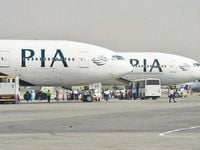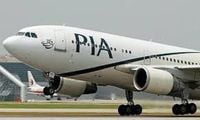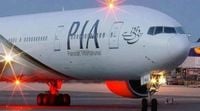ISLAMABAD: Pakistan International Airlines (PIA) is set to continue its hiatus from the UK market, as the UK Department for Transport (DfT) confirmed on March 25, 2025, that its air safety ban will remain in effect. This announcement dashed hopes for a rapid return of PIA after a four-year absence, which had seen the airline's operations curtailed by stringent safety regulations.
A spokesperson for the DfT emphasized, "Airlines must go through a rigorous procedure to have restrictions lifted," explaining that the UK Civil Aviation Authority is currently engaged in discussions with Pakistani authorities regarding the matter. This development comes at a time when reports suggested that the British Air Safety Committee had been considering lifting the ban, sparking initial optimism among Pakistani officials.
The air safety ban, which was first imposed in July 2020, resulted from a scandal where dozens of Pakistani pilots were found to be operating with fraudulent licenses. The issue came to light following a tragic accident involving a PIA Airbus A-320 in Karachi that resulted in nearly 100 fatalities. The then-aviation minister, Ghulam Sarwar Khan, publicly acknowledged the gravity of the situation, leading to the imposition of bans not only by the UK but also by the European Union and the United States. These bans have significantly impacted PIA's financial health, contributing to an estimated loss of Rs40 billion ($144 million) in annual revenue.
Despite these setbacks, there was a small silver lining for PIA as it managed to resume direct flights to Europe in January 2025, with a flight from Islamabad to Paris marking its return to international operations. Abdullah Hafeez Khan, a spokesperson for PIA, expressed the airline's eagerness to re-establish services to London, Manchester, and Birmingham once the DfT clears the existing ban. "London, Manchester, and Birmingham would be the most sought-after destinations," he noted, underlining the demand for PIA's service in these markets.
As the airline navigates through these challenges, the Pakistani government is moving ahead with plans to privatize PIA in a bid to restore its viability. A report from the Associated Press of Pakistan stated that a fast-tracked privatization plan has received approval from the Cabinet Committee on Privatisation (CCOP), which was discussed in a meeting chaired by Deputy Prime Minister Senator Ishaq Dar in Islamabad. This plan includes selling a stake of 51-100% in the airline, along with management control, all aimed at reducing the financial burden on the national treasury and maximizing PIA's potential.
Deputy Prime Minister Dar reaffirmed the government’s commitment to privatizing PIA, reflecting a broader strategy to overhaul the struggling national airline that has faced mounting financial pressures and operational inefficiencies.
PIA faces stiff competition in the aviation sector, holding only 23% of Pakistan's domestic market share, while its fleet of 34 planes is dwarfed by Middle Eastern carriers that dominate with about 60% market share. The absence of direct flights to key destinations has exacerbated its struggles, despite the airline having agreements with 87 countries for landing slots.
As PIA remains grounded in the UK, the focus turns to the potential outcomes of the ongoing civil aviation discussions and the future of the airline under government-led privatization efforts. Observers are keen to see how PIA will adapt to a competitive landscape that is becoming increasingly challenging in post-pandemic travel dynamics.
Given this context, the combination of regulatory hurdles and the necessity for financial reform creates a complex scenario for PIA. The airline's leadership team, alongside government officials, will need to navigate these waters to achieve a sustainable, long-term strategy that can rejuvenate Pakistan's national carrier.



